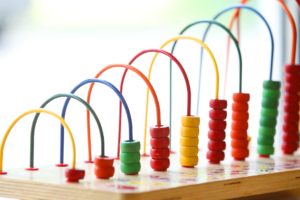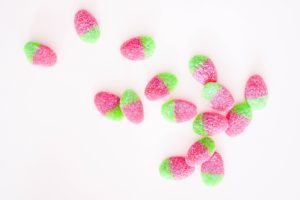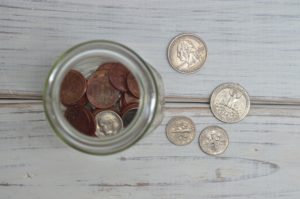“I’m not a math person.”
As a math teacher, I hear this quite often from both students and parents. Why do we say this about math? You don’t really hear people say they aren’t a reading person or a social studies person. They may say they don’t like reading or don’t like history but that’s a matter of interest. Saying, “I’m not a math person,” suggests that’s simply not who you are as if you have no control of it. While there is research to support some children’s innate number sense is better than others, there is also research supporting that math skills can be improved with practice. You can read more about the two above points in this discovermagazine.com article. It shouldn’t be surprising that math skills can be improved with practice because isn’t that true of anything?
The point is that any kid (outside of extenuating circumstances such as severe learning disabilities) can be strong at math. I’m not saying every kid is going to be a math genius, but they don’t need to be. What I’m saying is that every kid can be given the foundation to be strong enough at math that it doesn’t become a continuous struggle in school. Additionally, math has tremendous benefits from a general skills standpoint in developing critical thinking, organization, analysis, and logical reasoning to name a few.
Essential Math Skills to Expose and Teach to Your Toddler…and How to Do It
I breakdown five key, fundamental skills I believe kids should all begin to master at a young age. I teach middle school math and it’s amazing how many students just don’t have a good grasp of basic math concepts. The good news is that this really isn’t some daunting task that requires you to formally teach your kid math lessons. A lot of this simply comes down to exposing your kid to these concepts early on as a toddler in a natural way.
1. Basic Arithmetic

Even toddlers can begin doing basic arithmetic like adding. My 4 year old son loves adding on his fingers. I ask him questions like, “What’s 3 and 4 make?” He will put out 3 fingers on one hand and 4 on the other and count them to get 7. A good follow up is to ask what 4 and 3 make. Doing this will help them start discovering that the order being switched does not change the total.
Likewise, subtraction can be introduced early on in the same way. It’s easy to have your kid put out 4 fingers and ask what it makes if you put down 3 fingers. You can even have them begin to discover the issue of taking away more than there are. For example, have them put out 4 fingers and ask what it makes if you put down 5 fingers.
2. Patterns

A huge part of math is recognizing patterns. Even in more complex math concepts, there are often patterns at play. Help your kid, even when s/he is a toddler, begin to learn and see patterns. As I mentioned earlier, these skills don’t need to be done in a format of a formal lesson. You really want the learning to be natural at this age. For example, you can ask simple patterning questions while driving around. A useful tip is to be fun with it. You can do silly patterns with words such as, “Boo, Boo, Achoo!, Boo, Boo Achoo!” Also, just look for patterns when you’re out playing or running errands together as patterns are all around us in architectural designs and nature. As kids grow to understand patterns, they often love coming up with their own. This is great as this involves a higher level of thinking.
3. Estimation

There’s probably nothing that frustrates me more as a math teacher than students who have no concept of whether a solution to a problem is reasonable. For example, a student is asked to add 83.4 + 7.22 and gets 155.6. Clearly, the student just stacked the digits without any regard to the correct place values. Even if a student has not learned to line up the decimal points when adding, a student who gets estimation would be able to determine the value would be about 90.
With toddlers, begin to have them estimate amounts once they grasp the general concept of number size. You might have toddlers estimate a pile of M&Ms up to 20. Your goal here is for them to be able to estimate an amount like 18 M&Ms as a value more than 10 versus saying a number that’s clearly too small like 3 or 5.
This way, as older kids, they instinctively estimate problems like the example of 83.4 + 7.22. A great way to practice this with older kids is to utilize everyday opportunities such as going shopping or eating out.
4. Money, Money, Money!

Make a point to familiarize your toddler to recognizing and working with money. A solid understanding of money will assist your kid in so many essential math concepts such as place value, computation, decimals, fractions, percents, estimation, and more. In my math lessons, I often reference money, since by middle school, most students have a good background with money. One example where I often reference money is in taking half of an odd number like 7. Many students struggle with this concept, but using money as a reference allows students to grasp having to split that last seventh dollar into halves or $0.50. However, there are always some students who don’t have this background knowledge and it definitely hinders them in many areas of math.
If you think about it, money is probably the most common way the average person interacts with math. While only a tiny percentage of people will use algebra or calculus in their daily lives, everyone will need monetary skills. There’s no reason why toddlers can’t be exposed to money. For example, when a toddler begins to understand that 4 quarters make one whole dollar, it is setting the foundational understanding of fractions that will pay great dividends down the road.
5. Understanding Half

A sense of half of something is vital in math and everyday life. We constantly use half as a benchmark to relate quantities whether it’s time, money, or any amount. Developing a toddler’s sense of half helps them form an understanding of comparing what is there versus not there. A sense of half then helps older kids compare and order amounts such as 5/12 versus 2/3 as well as aiding in overall rounding and estimating skills. A sense of half also helps develop important skills such as time management and monitoring progress on tasks.
Even as adults, we use half as a guide to measure success or lack of success as well as monitoring ourselves. For example, we may associate a basketball player making half of the shots in a game as being successful. If we’re taking an exam and see that we have more than half of the testing time remaining, we may approach our pacing differently versus if we have less than half of the time left. It’s extremely beneficial to form this strong understanding of half at an early age.
It’s Easy to Neglect Math…Don’t Do It
As parents, there is so much focus on literacy. When should my toddler begin talking? When should they start reading? What is the best way to teach the alphabet? Of course all of this is important, but kids generally hear people talking constantly everyday. Even without specifically being taught, most toddlers will naturally begin talking at an appropriate age. But toddlers and kids won’t constantly get exposed to many of the important math concepts mentioned above on a consistent basis. So, if you want to set your kid up to be strong at math, you need to be mindful of exposing them to those important math concepts from an early age. Good luck!
Your Thoughts?
Do you have ideas to share of how you expose and teach your toddler/kid math? What struggles do you or your child have in math? Feel free to share your thoughts via the comments below.
This article and listed strategies are very helpful, even for adults.
Thanks Nina! I appreciate the feedback and am glad you found it informative.